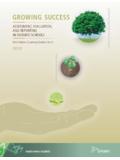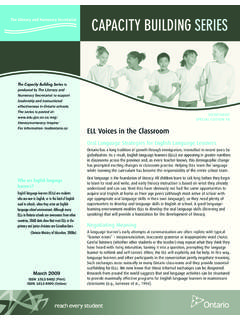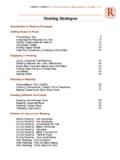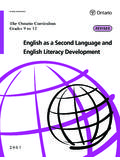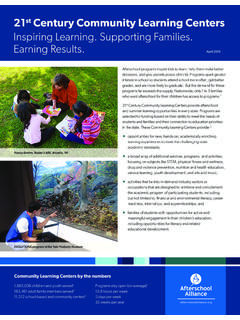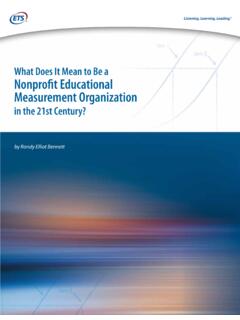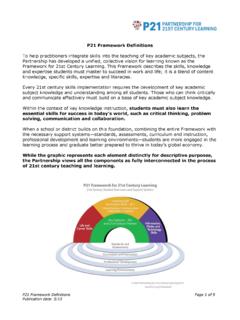Transcription of Community- Connected Experiential Learning - Ontario
1 community - Connected Experiential Learning A POLICY FRAMEWORK FOR Ontario SCHOOLS, KINDERGARTEN TO GRADE 12. D raft for C onsultation Winter 2016. Une publication quivalente est disponible en fran ais sous le titre suivant : Apprentissage par l'exp rience ax sur la communaut : Cadre strat gique pour les coles de l' Ontario de la maternelle et du jardin d'enfants la 12e ann e, 2016. This publication is available on the Ministry of Education website, at The Ontario Public Service endeavours to demonstrate leadership with respect to accessibility in Ontario . Our goal is to ensure that Ontario government services, products, and facilities are accessible to all our employees and to all members of the public we serve. This document, or the information that it contains, is available, on request, in alternative formats.
2 Please forward all requests for alternative formats to ServiceOntario at 1-800-668-9938 (TTY: 1-800-268-7095). Cont ents Preface 2. Introduction 4. 1. Community- Connected Experiential Learning : Purpose, Rationale, and Considerations for Implementation 6. Background and Rationale 6. Definition and Goals 7. The Experiential Learning Cycle 8. Creating community Connections 11. Leadership in Support of Experiential Learning 14. Connections to Education and Career/Life Planning 16. The Role of Technology in Community- Connected Experiential Learning 18. Assessment and Evaluation of Community- Connected Experiential Learning 19. 2. The Policy Framework for Community- Connected Experiential Learning , Kindergarten to Grade 12 21. The Expanded Role of Community- Connected Experiential Learning 21. The Design of the Framework 22.
3 Community- Connected Experiential Learning Linked to the Ontario Curriculum 24. Key Components 30. Cooperative Education: Community- Connected Experiential Learning Linked to the Curriculum and Eligible for Credit 32. The Cooperative Education Program 33. The Stand-Alone Cooperative Education Course 33. Community- Connected Experiential Learning beyond the Curriculum 34. Experiential Learning Assessment and Recognition (ELAR): Community- Connected Experiential Learning beyond the Curriculum and Eligible for Credit 35. The ELAR Process 36. Appendix: Characteristics of Experiential Learning 39. Glossary 40. References 46. Pr ef ace This consultation document sets out a proposed policy framework for Community- Connected Experiential Learning in Ontario schools, from Kindergarten to Grade 12. Consultations will occur in winter 2016 and will provide opportunities for a broad range of stakeholders, from educators to business and community organizations, non-profit agencies, and postsecondary institutions, to provide feedback that will inform the further develop- ment of the policy.
4 Stakeholders will be asked to consider the following questions:*. From your organization's perspective: What are some current opportunities for Experiential Learning that you can connect to the proposed policy framework? What are some innovative opportunities for Experiential Learning that might be possible under the proposed policy framework? How can you support students, during their Experiential Learning opportunity, in developing the skills needed for success in the future, such as critical thinking, problem solving, creativity, communication, and collaboration? What are some of the challenges or barriers to providing these Experiential Learning opportunities for all learners? What are the solutions? How can the ministry support your efforts in providing Experiential Learning opportunities for all students, as outlined in the policy framework?
5 *Feedback in response to these questions may be sent to: 2. The final policy document, which will be developed with the benefit of feedback from the consultations, will supersede Cooperative Educa- tion and Other Forms of Experiential Learning : Policies and Procedures for Ontario Secondary Schools, 2000. It will include sections that detail policy and procedures for: the revised cooperative education program;. a new stand-alone cooperative education course; credit recognition for students' demonstrated acquisition of skills and knowledge through Community- Connected Experiential Learning beyond the curriculum;. and enhanced and new opportunities for short- and medium-term Experiential Learning for students from Kindergarten to Grade 12. Preface 3. Int r oduc tion This document, Community- Connected Experiential Learning , outlines the role of Experiential Learning in helping to achieve Ontario 's vision for education, as described in Achieving Excellence: A Renewed Vision for Education in Ontario ( Ontario Ministry of Education, 2014).
6 That document articulates a vision and plan of action for the province based on a commitment to the success and well-being of every student and child. Providing our learners with opportunities to develop the knowl- edge and skills that will lead them to become personally successful, economically productive, and actively engaged citizens remains at the core of Ontario 's education system. Key themes in Achieving Excellence include commitments to provide students from Kindergarten to Grade 12 with a wide array of opportu- nities both inside and outside school that are compelling and contribute to their success (p. 4); to foster student engagement and achievement by creating more relevant, applied and innovative Learning experiences that spark students' curiosity and inspire them to follow their passions . (p.)
7 4); and to provide students with more flexibility and ownership in their Learning , allowing them, for example, to determine whether they want to spend more time on e- Learning or on Learning outside of the classroom (p. 6). The action plans outlined in Achieving Excellence underline the im- portance of expanding Learning opportunities outside the school to include Community- based, civic, humanitarian, scientific, and artistic activities, as well as cross-cultural and international experiences (p. 7). One of the ways of achieving this vision is to partner with community organizations and business to provide students with more Experiential Learning opportunities (p. 19). The involvement of and partnerships with community organizations and businesses are essential to the new and enhanced Experiential Learning opportunities envisaged for all students from Kindergarten to Grade 12.
8 This document outlines policy, procedures, and mechanisms for deep- ening and broadening the role of Experiential Learning for students from Kindergarten to Grade 12. This new policy framework reaffirms 4. the Ontario government's commitment to provide students with educational experiences and opportunities that strengthen the sense of engagement and motivation to learn that are foundational to all students' success. Section 1 of the document provides information on the background, purpose, rationale, and considerations for implementation associated with an expansion of Experiential Learning Connected to the community in Ontario schools. Section 2 sets out the design and scope of the new policy framework in two broad areas of Community- Connected experi- ential Learning Learning tied to the curriculum, and Learning beyond the curriculum.
9 In both areas, strategies are described for enhancing existing Experiential Learning programs, providing new Experiential Learning opportunities for students from Kindergarten to Grade 12, and enabling students in secondary schools to earn credit for Experiential Learning . Introduction 5. Community- Connected Experiential Learning : 1 Purpose, Rationale, and Considerations for Implementation Background and Rationale Early Experiential Learning theories emerged from an effort to have students actively engaging in their Learning . These theories proposed that students would learn by doing and, by applying knowledge to experience, develop new knowledge and skills. Rather than simply being presented with abstract concepts, students would be immersed . in Learning (Lewis & Williams, 1994). Experiential Learning is not simply Learning by doing; mere participation in a set of Learning activities does not make the Learning Experiential (Chapman, McPhee, & Proudman, 1995).
10 It is the process of reflecting on an experience, both during and after the experience, extracting meaning from it, and then applying what has been learned that makes the Learning truly Experiential for students. Experiential Learning assists students' Learning transfer; that is, it helps students to see the connections between the course content and its application in other contexts (Lee & Kahnweiler, 2000, cited in Furman & Sibthorp, 2013). It also has psycho-social benefits for students, including increased self-esteem and engagement in the workplace or school, improved motivation, and improved social and leadership skills (Canadian Council on Learning , 2009). Community- Connected Experiential Learning builds on research that indicates that students are more engaged, more motivated to learn, and more successful when they can connect what they are Learning to situations they care about in their community and in the world.




